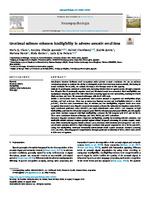Repositorio Digital
Emotional salience enhances intelligibility in adverse acoustic conditions
JavaScript is disabled for your browser. Some features of this site may not work without it.
Mostrar el registro sencillo del ítem
| dc.contributor.author | Olano, María A. | |
| dc.contributor.author | Elizalde Acevedo, Bautista | |
| dc.contributor.author | Chambeaud, Nahuel | |
| dc.contributor.author | Acuña, Andrés | |
| dc.contributor.author | Marcó, Mariano | |
| dc.contributor.author | Kochen, Silvia | |
| dc.contributor.author | Alba-Ferrara, Lucía | |
| dc.date.accessioned | 2023-04-05T13:12:44Z | |
| dc.date.available | 2023-04-05T13:12:44Z | |
| dc.date.issued | 2020-08-19 | |
| dc.identifier.other | https://doi.org/10.1016/j.neuropsychologia.2020.107580 | |
| dc.identifier.uri | http://repositorio.hospitalelcruce.org/xmlui/handle/123456789/1354 | |
| dc.description | Fil: Olano, María A. Departamento de Psicología, Facultad de Ciencias Biomédicas, Universidad Austral, Pilar. Buenos Aires; Argentina | es |
| dc.description | Fil: Elizalde Acevedo, Bautista Departamento de Psicología, Facultad de Ciencias Biomédicas, Universidad Austral, Pilar. Buenos Aires; Argentina | es |
| dc.description | Fil: Chambeaud, Nahuel Unidad Ejecutora para el Estudio de las Neurociencias y Sistemas Complejos (ENyS), Consejo Nacional de Investigaciones Científicas y T´ecnicas (CONICET). Buenos Aires; Argentina | es |
| dc.description | Fil: Acuña, Andrés e Instituto de Biología Celular y Neurociencia de Robertis (IBCN), Facultad de Medicina, Universidad de Buenos Aires; Argentina | es |
| dc.description | Fil: Marcó, Mariano Unidad Ejecutora para el Estudio de las Neurociencias y Sistemas Complejos (ENyS), Consejo Nacional de Investigaciones Científicas y Técnicas (CONICET). Buenos Aires; Argentina | es |
| dc.description | Fil: Kochen, Silvia Unidad Ejecutora para el Estudio de las Neurociencias y Sistemas Complejos (ENyS), Consejo Nacional de Investigaciones Científicas y T´ecnicas (CONICET). Buenos Aires; Argentina | es |
| dc.description | Fil: Alba-Ferrara, Lucía Departamento de Psicología, Facultad de Ciencias Biomédicas, Universidad Austral, Pilar. Buenos Aires; Argentina | es |
| dc.description.abstract | Introduction: Emotion facilitates word recognition under adverse acoustic conditions. We use an auditory emotional paradigm to evaluate the ability to distinguish words from irrelevant random stimuli, elucidating its neural correlates. Secondarily, we evaluate the impact of schizotypy traits on this capacity. Methods: 25 participants, undertook an fMRI task, indicating whether they recognized words, through a response box. 20 audio files of emotionally negative words and 20 neutral words were presented. Word intelligibility was manipulated merging the audio files with white noise at varying signal-to-noise ratios (SNR), resulting in 3 levels (high, medium, and low). We measured schizotypy with the O-LIFE scale. Results: A 2x3 factorial ANOVA was performed with emotion (neutral or negative) and intelligibility (high, medium, and low) as factors. There was an interaction between emotion and intelligibility [F(2,44) = 23.89, p<0.001]. Post hoc t-test demonstrated that, in medium and low intelligibility, negative words were more recognized than neutral ones. Negative words minus neutral, activated the right anterior cingulate cortex (rACC), right dorsolateral prefrontal cortex (rDLPFC), and right orbitofrontal cortex (rOFC). Low compared to high intelligibility, activated the left medial temporal gyrus (lMTG), left supramarginal gyrus (lSMG), and left angular gyrus (lAG). Medium compared with high intelligibility, activated the left temporal pole (lTP) and the lMTG. There were correlations between schizotypy and rACC, lMTG, and rOFC activations. Discussion: Negative emotional salience improves intelligibility, possibly by recruiting selective attention. Less intelligible stimuli activated temporo-parietal regions related to speech processing in adverse acoustic conditions, while emotionally negative stimuli activated areas associated with emotional processing (rACC and rOFC) and selective attention (rDLPFC). High schizotypy correlated with greater responses in rACC, lMTG, and rOFC, during low intelligibility. Irrelevant emotionally salient stimuli would capture automatic attention activating rACC and rOFC, enhancing speech comprehension through additional recruitment of lMTG, which could derive in false word recognition. | es_AR |
| dc.language.iso | en | es_AR |
| dc.relation.ispartofseries | NEUROPSYCHOLOGIA;vol. 147 | |
| dc.subject | Hallucinations | es_AR |
| dc.subject | Schizotypy | es_AR |
| dc.subject | Emotional salience | es_AR |
| dc.title | Emotional salience enhances intelligibility in adverse acoustic conditions | es_AR |
| dc.type | Article | es_AR |

